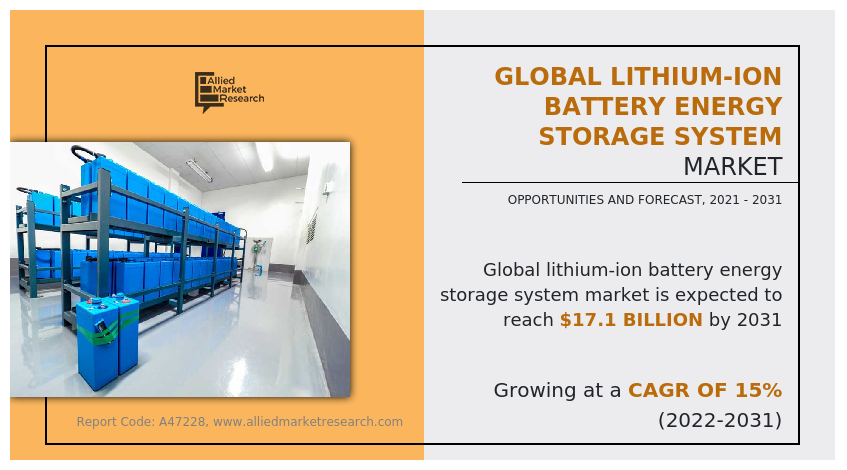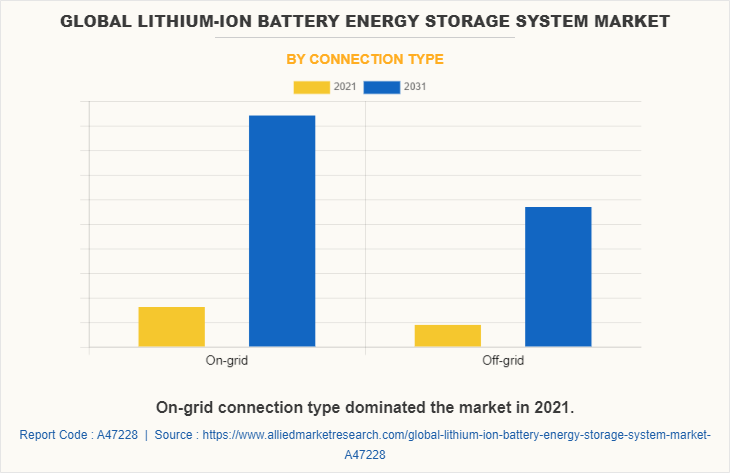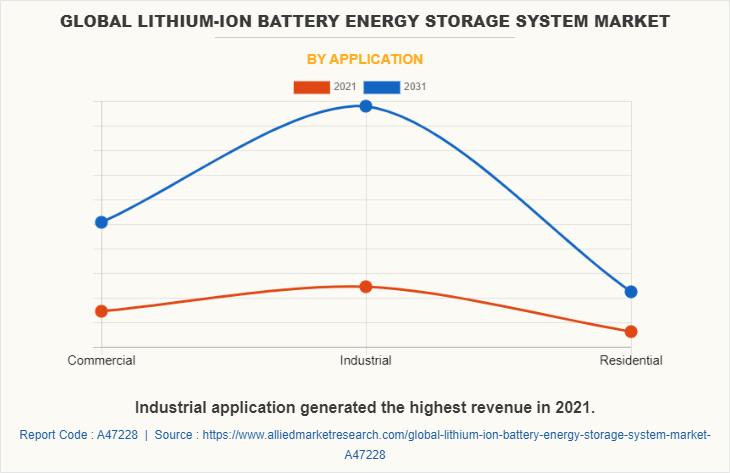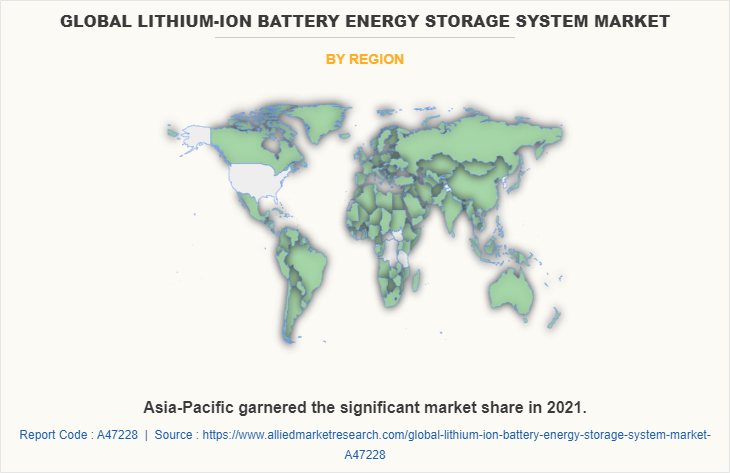Lithium-Ion Battery Energy Storage System Market Research, 2031
The Global Lithium-ion Battery Energy Storage System Market was valued at $4.5 billion in 2021, and is projected to reach $17.1 billion by 2031, growing at a CAGR of 15% from 2022 to 2031.
A lithium-ion battery energy storage system is an electrochemical device that charges or collects energy from the grid or a power plant and then discharges that energy later to provide electricity or other grid services when needed. Battery storage is an important technology that can enhance power system flexibility and enable high levels of renewable energy integration.

Modern lithium-ion battery energy storage systems usually include a built-in inverter and computerized control systems that make them simple to install, largely maintenance-free and do not require any effort or expertise from the user. Battery energy storage systems have a wide range of end-users for both commercial and residential purposes. Commercial end-users include peak shaving, load shifting, emergency backup, and various grid services. Residential end-users include self-consumption, off-grid homes, and emergency backup.
The key lithium-ion battery energy storage system market leaders profiled in the report include Toshiba Corporation, Parker Hannifin Corporation, Jakson Group, Siemens AG, Hitachi Ltd., Honeywell International Inc., LG Electronics Inc., Samsung Electronics Co Ltd, Panasonic Corporation, and ABB Ltd. These key players adopt several strategies such as new product launch and development, acquisition, partnership and collaboration and business expansion to increase the lithium-ion battery energy storage system market share during the forecast period.
Key Takeaways
The global lithium-ion battery energy storage system market study covers 20 countries. The research includes a segment analysis of each country in terms of value for the projected period.
More than 1,500 product literatures, industry releases, annual reports, and other such documents of major market industry participants along with authentic industry journals, trade associations' releases, and government websites have been reviewed for generating high-value industry insights.
The study integrated high-quality data, professional opinions and analysis, and critical independent perspectives. The research approach is intended to provide a balanced view of global markets and to assist stakeholders in making educated decisions to achieve their most ambitious growth objectives.
Key Market Dynamics
The lithium-ion battery energy storage system market is experiencing robust growth due to the increasing demand for renewable energy integration, electric vehicles, and grid modernization. Factors such as declining battery costs, advancements in technology, and government incentives further propel lithium-ion battery energy storage system market expansion.
However, challenges like raw material supply constraints, recycling issues, and safety concerns regarding battery performance can restrain growth.
Looking ahead, there are opportunities in developing innovative battery chemistry, enhancing recycling processes, and expanding applications in sectors like residential energy storage and industrial use. Additionally, the rise of smart grids and energy management systems will create further avenues for growth. Overall, the market is poised for significant advancements as sustainability and energy efficiency gain prominence worldwide.
Segment Overview
The global lithium-ion battery energy storage system market outlook is segmented into Connection Type and Application.

By connection type, the market is classified into on grid and off grid connection.The lithium-ion battery energy storage system market trends is expected to witness notable growth during the forecast period, owing to the rise in demand for grid energy storage systems for ongoing grid modernization, rapid penetration of lithium-ion batteries in renewable energy sector.

By application, it is divided into industrial, commercial, and residential.Moreover, the rise in trend of adopting low-carbon and less fossil fuel-based economy and ongoing renewable energy revolution are expected to fuel the growth of the lithium-ion battery energy storage system industry. However, the high capital expenditure required for installing lithium-ion battery energy storage systems is restraining the lithium-ion battery energy storage systemmarket growth. On the contrary, factors such as rapid increase in number of rural electrification projects worldwide, surge in need for continuous power supply especially for the growing number of data centers and decline in prices of lithium-ion batteries are expected to create huge opportunities for the adoption of lithium-ion battery energy storage system in near future.

Region wise, the market is analyzed across North America, Europe, Asia-Pacific, and LAMEA along with their prominent countries.
Country-wise, the U.S. acquired a prime share in the lithium-ion battery energy storage system market in the North American region and is expected to grow at a significant CAGR during the forecast period of 2022-2031. The U.S., holds a dominant position in the lithium-ion battery energy storage system market, owing to the rise in investment by prime vendors to boost the lithium-ion battery energy storage system for consumer electronics and IT & telecom applications.
In Europe, the UK, dominated the lithium-ion battery energy storage system market, in terms of revenue, in 2021 and is expected to follow the same trend during the forecast period. However, Germany is expected to emerge as the fastest-growing country in Europe's lithium-ion battery energy storage system with a notable CAGR, due to advancement in the automotive industry which drives the usage of microelectronics in the country and thus creates lucrative growth opportunities for the lithium-ion battery energy storage system market in Germany.
In Asia-Pacific, China is expected to emerge as a significant market for the lithium-ion battery energy storage system industry, owing to new product developments and a significant rise in investment by prime players and government institutions. The well-established electronics industry in the Asia-Pacific region and the adoption of innovative technologies have given organizations in the region a competitive edge in the market.
In the LAMEA region, the Middle East countries garner significant market share in 2021 due to the adoption of new technologies, digital transformation and connectivity are reshaping the future of the automotive and consumer electronics industry in the Middle East. Moreover, the Latin America region is expected to grow at a significant CAGR from 2022 to 2031, owing to shifts in artificial intelligence, industry 4.0, and smart technological changes in recent years, which is expected to reshape the growth of the lithium-ion battery energy storage system in the Latin America region.
Top Impacting Factors
Significant factors impacting the growth of the lithium-ion battery energy storage system market include a rise in demand for lithium-ion batteries in lithium-ion battery energy storage system and increase in demand for grid energy storage systems owing to ongoing grid modernization. However, the high capital expenditure required for installing lithium-ion battery energy storage systems may hamper market growth. Furthermore, the surge in the number of rural electrification projects worldwide provides lucrative opportunities for market growth.
Regional/Country Market Outlook
The global lithium-ion battery energy storage system market share is experiencing substantial growth, with Asia Pacific playing a pivotal role in this expansion. Asia Pacific leads the market, propelled by rapid industrialization, growing renewable energy projects, and increasing adoption of electric vehicles in countries like China, Japan, and South Korea. Government policies supporting clean energy, along with significant investments in grid infrastructure and battery manufacturing, further drive the region's market dominance. Further, The North America lithium-ion battery energy storage system market is witnessing rapid growth due to the increasing deployment of renewable energy, government incentives, and the rising demand for grid stability. Additionally, the expansion of electric vehicle infrastructure and advancements in battery technology are further boosting market growth across the region.
Competitive Analysis
Competitive analysis and profiles of the major global lithium-ion battery energy storage system market players that have been provided in the report include Toshiba Corporation, Parker Hannifin Corporation, Jakson Group, Siemens AG, Hitachi Ltd., Honeywell International Inc., LG Electronics Inc., Samsung Electronics Co Ltd, Panasonic Corporation, and ABB Ltd. The global lithium-ion battery energy storage system market is highly competitive, owing to the strong presence of existing vendors. Vendors of the lithium-ion battery energy storage system market with extensive technical and financial resources are expected to gain a competitive advantage over their competitors because they can cater to market demands. The competitive environment in this market is expected to increase as technological innovations, product extensions, and different strategies adopted by key vendors increase.
Report Coverage & Deliverables
This report delivers in-depth insights into the lithium-ion battery energy storage system market covering connection type, and application employed by major players. It offers detailed market forecasts and emerging trends.
Connection Type Insights
On-grid lithium-ion battery energy storage systems dominate the market due to their integration with existing power grids, supporting renewable energy and grid stability. Off-grid systems are gaining traction in remote and rural areas, where independent energy solutions are needed, offering opportunities for energy access in regions with unreliable grid infrastructure.
Application Insights
Industrial applications lead due to high energy demands and the need for grid stabilization in manufacturing and utilities. Residential adoption is rising, driven by increasing home energy storage solutions for backup power. Commercial use, including retail and office spaces, supports energy cost savings and efficiency.
Regional Insights
The Asia-Pacific region dominates the lithium-ion battery energy storage market, driven by strong renewable energy adoption and electric vehicle growth. North America follows, propelled by government incentives and grid modernization. Europe is expanding rapidly due to stringent climate policies and green energy projects, while emerging markets in Latin America and Africa show potential for off-grid energy solutions.
Key Developments/ Strategies
Toshiba Corporation, Parker Hannifin Corporation, Jakson Group, Siemens AG, Hitachi Ltd., Honeywell International Inc., LG Electronics Inc., Samsung Electronics Co Ltd, Panasonic Corporation, and ABB Ltd. are the key players of the lithium-ion battery energy storage system market. Top market players have adopted various strategies, such as acquisition, agreement, business development, business expansion, collaboration, product launch, innovation, and product expansion to expand their foothold in the lithium-ion battery energy storage system market.
- In February 2022, LG Energy Solution acquired NEC Energy Solutions; a grid battery integrator based in the U.S. to expand its Energy Storage System (ESS) business offerings. The battery manufacturer has fully acquired shares of NEC Energy Solutions from its parent, NEC Corporation (NEC; TSE:6701), headquartered in Japan. With the deal, LGES will establish a corporation under a new name, LG Energy Solution Vertech. Inc.
- In November 2021, Hitachi Energy launched improved and new versions of its power store battery energy storage system (BESS) products, alongside other new and updated products and services in its grid edge solutions portfolio.
- In October 2021, Honeywell launched a new flow battery technology that works with renewable generation sources such as wind and solar to meet the demand for sustainable energy storage. The new flow battery uses a safe and non-flammable electrolyte that converts chemical energy to electricity in order to store energy for later use while meeting the environmental, longevity, and safety objectives of utilities.
Key Benefits For Stakeholders
- This study comprises analytical depiction of the lithium-ion battery energy storage system market size along with the current trends and future estimations to depict the imminent investment pockets.
- The overall lithium-ion battery energy storage system market analysis is determined to understand the profitable trends to gain a stronger foothold.
- The report presents information related to key drivers, restraints, and opportunities with a detailed impact analysis.
- The lithium-ion battery energy storage system market forecast is quantitatively analyzed from 2022 to 2031 to benchmark the financial competency.
- The Porter’s five forces analysis illustrates the potency of the buyers and suppliers in the lithium-ion battery energy storage system market.
- The report includes the share of key vendors and market trends.
Lithium-Ion Battery Energy Storage System Market Report Highlights
| Aspects | Details |
| Market Size By 2031 | USD 17.1 billion |
| Growth Rate | CAGR of 15% |
| Forecast period | 2021 - 2031 |
| Report Pages | 324 |
| By Connection Type |
|
| By Application |
|
| By Region |
|
| Key Market Players | Jakson Group, Siemens AG, Panasonic Corporation, Samsung Electronics Co Ltd, Hitachi Ltd., Honeywell International Inc., Toshiba Corporation, LG Electronics Inc., Parker Hannifin Corporation, ABB Ltd. |
Analyst Review
The lithium-ion battery energy storage system market is expected to leverage high potential for the on-grid and off-grid battery energy storage system during the forecast period. Owing to the strong presence of existing vendors. Battery energy storage system vendors, investing substantially in R&D and skilled workforce, are anticipated to gain a competitive edge over their rivals. The competitive environment in this market is expected to further intensify with an increase in technological innovations, product extensions, and different strategies adopted by key vendors.
The surge in demand for battery energy storage systems in rural areas around the world for reliable energy supply is driving the need for enhanced measurement and test equipment. Moreover, major economies, such as the U.S., China, the UK, and Japan plan to develop and deploy advanced battery energy storage systems across various sectors.
Key lithium-ion battery energy storage system market leaders profiled in the report include Toshiba Corporation, Parker Hannifin Corporation, Jakson Group, Siemens AG, Hitachi Ltd., Honeywell International Inc., LG Electronics Inc., Samsung Electronics Co Ltd, Panasonic Corporation, and ABB Ltd.
Asia-Pacific is the largest regional market for global lithium-ion battery energy storage system.
Industrial generated the largest revenue in 2021 during the forecast period.
The key trends lithium-ion battery energy storage system include increase in demand for renewable energy sources along with rise in concerns among the governments of several nations about the adverse effects climate change and a rapid shift toward low carbon energy generation.
The lithium-ion battery energy storage system market was valued at $4,468.30 million in 2021.
Toshiba Corporation, Jakson Group, Siemens AG, Honeywell International Inc., LG Electronics Inc., Samsung Electronics Co Ltd, and Panasonic Corporation are the top companies to hold the market share in global lithium-ion battery energy storage system market.
Loading Table Of Content...


